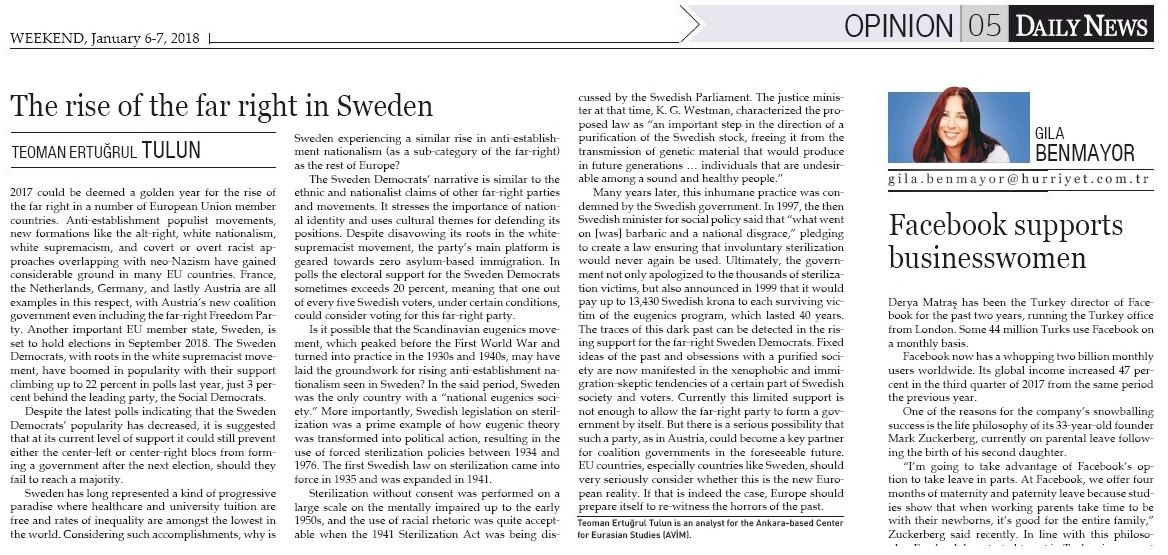
Teoman Ertuğrul Tulun
Hürriyet Daily News (Weekend, January 6-7, 2018, p. 5)
The year 2017 might be deemed as the golden year for the far-right’s rise in European Union (EU) countries. Anti-establishment populist movements, new formations like the alt-right, white nationalism, white supremacism, and covert or overt racist approaches overlapping with Neo-Nazism have gained considerable ground in many EU countries. France, the Netherlands, Germany, and lastly Austria are all examples in this respect. Austria’s new coalition government even includes the far-right Freedom Party.
Another important EU member state, Sweden, is set to hold its elections in September 2018. The Sweden Democrats (SD), with roots in the white supremacist movement, according to last year polls, have boomed in popularity with their support climbing up to 22%, just 3% behind the leading party Social Democrats. Despite the latest polls indicating that its popularity has decreased, it is claimed that at its current level of support, the SD would still have enough clout to block either the center-left or center-right blocs from forming a government after the next election, should such blocs fail to reach a majority.
Sweden has represented a progressive paradise where healthcare and university tuition are free, workers receive a world-record 480 days of paid parental leave, and inequality is amongst the lowest in the world. Considering such accomplishments, why is Sweden experiencing the same rise in anti-establishment nationalism (as a sub-category of the far-right) as the rest of Europe?
The Sweden Democrats’ narrative is similar to the ethnical and nationalist claims of other far-right parties and movements. It stresses the importance of national identity and uses cultural themes for defending its positions. Despite disavowing its roots in the white-supremacist movement, SD’s main platform is geared towards zero asylum-based immigration. According to the polls, the electoral support for SD sometimes exceeds 20%. This means that one out of every five Swedish voters, under certain conditions, consider voting for the far-right party.
Is it possible that the Scandinavian eugenics movement, which peaked before the First World War and turned into practice in the 1930s and 1940s, may have laid the groundwork for the rising anti-establishment nationalism seen in Sweden? In the said period, Sweden was the only country with a national eugenics society. More importantly, legislation on sterilization was the prime example of how eugenic theory was transformed into political action, resulting in the use of forced sterilization policies between 1934 and 1976. The first Swedish law on sterilization came into force in 1935, and was expanded in 1941. Sterilization without the consent of the mentally impaired were performed on a large scale up to the early 1950s. The use of race rhetoric was quite acceptable when the 1941 Sterilization Act was being discussed by the Swedish Parliament. The Minister of Justice at that time, K. G. Westman, characterized the proposed law as “an important step in the direction of a purification of the Swedish stock, freeing it from the transmission of genetic material which would produce, in future generations, … individuals that are undesirable among a sound and healthy people.”
Many years later, this inhumane practice was condemned by the Swedish government. In 1997, Margot Wallstrom, the then Swedish Minister for Social Policy stated; “what went on [was] barbaric and a national disgrace”, pledged to create a law ensuring that involuntary sterilization would never again be used, and promised compensation to the victims. Ultimately, the Swedish government not only apologized to the thousands of sterilization victims, but also announced in 1999 that it would pay up to £13,430 to each surviving victims of the eugenics program that lasted 40 years.
The traces of this dark past can be detected in the rising support for the far-right Sweden Democrats. Fixed ideas of the past and obsessions with a purified society now manifest themselves as xenophobic and immigration-skeptic tendencies in a certain part of the Swedish society and voters. Currenly, this limited support is not enough to allow the far-right party to form a government by itself. However, there is a serious possibility that such a party, like in Austria, may become a key partner for coalition governments in the foreseeable future. EU countries, especially countries like Sweden, should very seriously consider whether this is the new European reality. If this is the case, Europe should prepare itself to re-witness the horrors of the past.
Teoman Ertugrul Tulun is an analyst for the Ankara-based Center for Eurasian Studies (AViM).
© 2009-2025 Avrasya İncelemeleri Merkezi (AVİM) Tüm Hakları Saklıdır
Henüz Yorum Yapılmamış.
-
 BALKANLARDA İSTEKSİZ AB GENİŞLEMESİ - DAILY SABAH - 14.05.2018
BALKANLARDA İSTEKSİZ AB GENİŞLEMESİ - DAILY SABAH - 14.05.2018
Teoman Ertuğrul TULUN 23.05.2018 -
 BROKEN TREATY: IGNORED RIGHTS OF TURKISH MUSLIM MINORITY IN GREECE - DAILY SABAH - 12.09.2025
BROKEN TREATY: IGNORED RIGHTS OF TURKISH MUSLIM MINORITY IN GREECE - DAILY SABAH - 12.09.2025
Teoman Ertuğrul TULUN 15.09.2025 -
 AVRASYA’DA İVEDİ İŞBİRLİĞİNE DAYALI YENİ BİR GÜVENLİK DÜZENİ GEREKSİNİMİ - HÜRRİYET DAILY NEWS - 19.10.2018
AVRASYA’DA İVEDİ İŞBİRLİĞİNE DAYALI YENİ BİR GÜVENLİK DÜZENİ GEREKSİNİMİ - HÜRRİYET DAILY NEWS - 19.10.2018
Teoman Ertuğrul TULUN 24.10.2018 -
 EMMANUEL MACRON AGITATES AND DESTABILIZES EUROPE - DAILY SABAH - 21.11.2019
EMMANUEL MACRON AGITATES AND DESTABILIZES EUROPE - DAILY SABAH - 21.11.2019
Teoman Ertuğrul TULUN 25.11.2019 -
 BALKANLAR: NE AB’NİN ARKA BAHÇESİ NE DE HERHANGİ BİR ÜLKENİN OYUN SAHASI - DAILY SABAH - 24.10.2018
BALKANLAR: NE AB’NİN ARKA BAHÇESİ NE DE HERHANGİ BİR ÜLKENİN OYUN SAHASI - DAILY SABAH - 24.10.2018
Teoman Ertuğrul TULUN 02.11.2018
-
 DISREGARD FOR THE TENETS OF UNBIASED LEARNING AT CSUN: A LETTER TO CSUN PRESIDENT
DISREGARD FOR THE TENETS OF UNBIASED LEARNING AT CSUN: A LETTER TO CSUN PRESIDENT
Dr. Bulent BASOL 22.11.2016 -
 EMMANUEL MACRON AGITATES AND DESTABILIZES EUROPE - DAILY SABAH - 21.11.2019
EMMANUEL MACRON AGITATES AND DESTABILIZES EUROPE - DAILY SABAH - 21.11.2019
Teoman Ertuğrul TULUN 25.11.2019 -
STEPHAN İHRİG’İN “ ATATÜRK IN THE NAZI IMAGINATION” KİTABI HAKKINDA BAZI DÜŞÜNCELER - ÖNDER ÖZAR
Önder ÖZAR 29.09.2015 -
 KIBRIS MÜZAKERE “PRANGASI”
KIBRIS MÜZAKERE “PRANGASI”
Tugay ULUÇEVİK 04.07.2017 -
 TURKEY-ARMENIA RELATIONS - DIPLOMATIC OBSERVER - NOVEMBER 2020
TURKEY-ARMENIA RELATIONS - DIPLOMATIC OBSERVER - NOVEMBER 2020
Alev KILIÇ 05.11.2020


